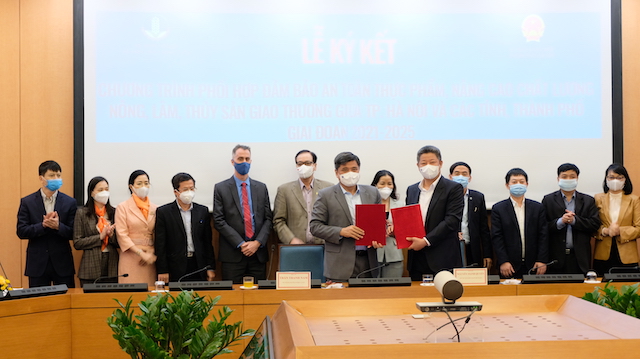Hanoi to promote farm produce chains with int’l standards
Cooperation to connect production with consumption, promote trade in the agro-forestry and fishery sector between Hanoi and other localities across the country will be enhanced.
Hanoi is expected to increase by at least 10% of the total number of supply chains of safe agro-forestry-fishery food with provinces and cities each year. Among the total, 5% of them will meet international standards.
This is the goal set out under the program “Ensuring food safety, improving the quality of agro-forestry and fishery products traded between Hanoi and provinces and cities in the 2021-2025 period”, which was signed between the Ministry of Agriculture and Rural Development and the Hanoi People's Committee on October 23.
| Deputy Minister of Agriculture and Rural Development Tran Thanh Nam (L) and Vice Chairman of the Hanoi People's Committee (R) at the signing ceremony. HNT Photo: Trong Tung |
Addressing at the signing ceremony, Deputy Minister of Agriculture and Rural Development Tran Thanh Nam said the capital city will be guided to build a value chain of agro-forestry-fishery products according to international standards.
“The ministry will advise participants in the program to perfect mechanisms and policies to develop the supply chains,” he underlined.
The program consists of three main contents: increasing the number and scale of sustainable agro-forestry-fishery food supply chains, ensuring food safety, traceability, quality improvement and added value, as well as building brands, organizing trade connection and promotion of products domestically and overseas.
The Deputy Minister also emphasized the importance of regional linkage in production and consumption of agricultural products. "To ensure the interests of consumers, the agricultural industry needs to create conditions to connect supply and demand, but also control the quality, food safety and hygiene of the supply chains," said Deputy Minister Nam.
In the immediate term, the ministry will organize the signing of the cooperation agreement, securely linking the production and consumption of goods between Hanoi and 45 provinces and cities across the country.
At the event, Vice Chairman of the City People’s Committee Nguyen Manh Quyen said, in order to continue implementing activities of the promotion, connection and consumption of safe agricultural, forestry and fishery products from provinces and cities in Hanoi, the city will research and deploy trade promotion programs and events that can adapt safely and flexibly to prevention and control of the Covid-19 pandemic.
The Vice Chairman of the city said with an important geographical and political position, the capital is both the largest production center in the North and a commodity consumption market with a large distribution network, promoting the development of production and business of the Red River Delta and regions throughout the country.
Though Hanoi has an agricultural land area of about 189,000ha, accounting for 56% of the total natural land area, its production capacity only meets 30% of the demand. The shortage of goods supply has been addressed by distributors, supermarkets, food chains, traders from provinces and cities.
In the first ten months of this year, over 220,000 tons of goods supplied from other provinces and cities were sold by the city’s supermarkets, and food chains. Many local businesses have promoted the sale of essential goods through e-commerce websites and hotlines, according to the municipal Department of Industry and Trade.
According to Tran Thi Phuong Lan, Acting Director of the Hanoi Department of Industry and Trade, many products sold in the distribution network have not met criteria of quantity, output and quality as well as traceability. In particular, the number of specialties under the One Commune, One Product (OCOP) is still very small.
To enhance the connection among the provinces and cities, she suggested that localities continue should review specialty products to harmonize the standards of quality and quantity, in accordance with the needs and supply-demand balance, avoiding overproduction.
“Localities need to focus on improving product value as Hanoians are willing to buy specialties and quality products at high prices”, she said.
Currently, the city has 22 commercial centers, 134 supermarkets, 454 wholesale and wet markets, 1,800 convenience stores, 141 food chains, over 20,000 traditional stores, and 8,355 goods selling points.











